SA Weekend: Restless Dance Theatre, Michael Hodyl and 30 years of changing lives
A pioneering Adelaide dance company has helped thousands of people with a disability find their voice - and injected an important new perspective to Australia’s cultural landscape.
SA Weekend
Don't miss out on the headlines from SA Weekend. Followed categories will be added to My News.
Michael Hodyl smiles, clasps his hands together, rocks forward and nods deeply in agreement when told his father describes him as a natural entertainer.
“Yes,” he says gently. “That’s very true. That’s my nature. That’s who I am.”
Ever since he was a little boy, Hodyl has loved a crowd. Put more than one person in front of him, his dad says, and he’ll perform. Never mind the fact that Hodyl, now 31, was born with Down syndrome, a chromosomal disorder that causes intellectual and developmental problems. Like many with the same disorder, Hodyl grew up with a love of song and dance and family and friends were regularly roped in as willing audience members.
Despite his overt enthusiasm, Hodyl’s parents spent his childhood concerned about his future, unsure how he would find purpose and fit in to an adult world which often marginalises people with a disability.
Sure, he is a graduate of regular schooling, loves to cook and is passionate about sport. He has tried his hand at cricket and football, is a diehard Port Adelaide Football Club supporter and a whiz when it comes to recalling random sporting trivia.
His life has been rich and full but still, like the parents of any child with a disability, Roman and Svetlana Hodyl spent countless hours worrying about what the future might hold for their eldest child. They worried that his genetic disorder might leave him on the outer – ostracised from the mainstream.
And then he found dance.
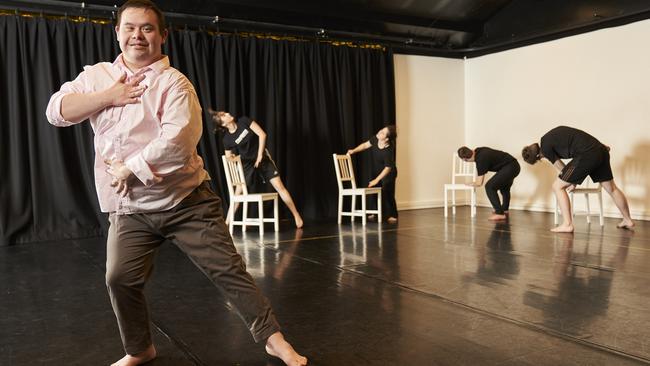
A family friend, who was also one of his former teachers, suggested he check out Adelaide’s Restless Dance Theatre – Australia’s leading dance theatre company for people with and without a disability.
That was more than 10 years ago. The rest, as they say, is history.
Today, Hodyl is a professional dancer with Restless. He has performed in front of packed houses across Australia and overseas as part of a company troupe that is helping tear down the barriers that have traditionally surrounded people with a disability. But more on that later.
For Hodyl and his family, his life as a dancer is not just fulfilling a childhood dream to perform. And it’s not just developing the onstage skills, fitness and artistic creativity that comes with rehearsing at least three full days a week in the Restless studio.
It’s also about learning the life skills to become a more independent, functioning member of society. It’s about catching public transport to rehearsals and hanging out with mates in Rundle Mall.
It’s about making lifelong friends who are sharing a journey their parents might never have imagined possible. It’s about contributing to the cultural landscape. And it’s about developing the confidence to teach others his craft and the pride and self-worth he feels when the curtain falls after the audience erupts.
“I started a journey,” he says when I ask him to describe the opportunities dancing at Restless have afforded him. “It’s been an extraordinary experience for me. I like the freedom of dancing; I can express my emotions through dancing.”
And what about the thrill of performing in front of an audience, the thrill he has enjoyed since he was a child?
“Well, it shows off who you are. It makes the audience part of your dancing. It (their applause) makes you feel proud of yourself. You always have that in you.”
Hodyl smiles as he talks about the excitement the group feels at the end of a performance, and about how his body has changed and become stronger as he has become more and more dedicated to his life as a dancer.
The transformational value of dance has been experienced by thousands of other South Australians with and without a disability who have attended Restless workshops over the past three decades. And none of it would have been possible without the pioneering work of an English dancer and disability worker who fell in love with Adelaide during a flying visit to the city in the late 1980s.
Sally Chance was in her mid 20s and carving out a career in the dance and disability field in the UK with Ludus Dance, a community dance company that accepted an invitation to send some guest artists to SA’s biennial Come Out children’s arts festival in 1989.
Australia had never been on Chance’s radar but after spending a few weeks here for Come Out, she liked the place so much she returned under her own steam the following year.
Initially she was freelancing, co-ordinating dance projects which involved young people with a disability. She formed a close partnership with Carclew arts and cultural centre in North Adelaide, collaborated with like-minded people and organisations and, in late 1991, they launched Restless Dance Theatre, which this month celebrates its 30th anniversary.
Restless remains the only dance company of its kind in Australia and has helped open the door to dance as an art form, fitness tool and cultural focus for thousands of people with and without disabilities.
“There was a whole movement in the UK at the time (the 1980s) known as community dance,” Chance recalls. “The training that I did responded to that concept of open access for anybody who wants to take part in dance. It was a cultural movement that just clicked with me.
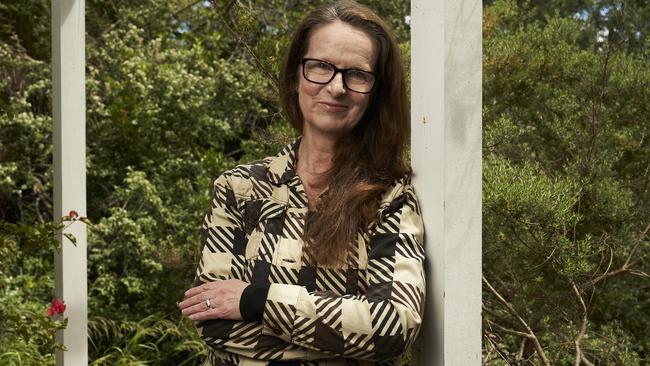
“It was about participation … but it very quickly became about the contribution of different social groups, perhaps hitherto marginalised socially, to make their cultural statement. Each local authority (in the UK) wanted a community dance practitioner … to generate activity – youth activity, early years activity – or work with older people, work with different cultural groups or migrant groups, work with people with disabilities or people struggling with their mental health.
“I was particularly interested in working with disabled people. The minute I got going in that kind of work, it became clear to me how powerful the contribution of people with a disability could be to dance.”
Chance brought that ethos to Adelaide, where she became a prime mover and the first artistic director of Restless, which was initially based at Carclew and moved through various venues across the suburbs and the CBD before settling in its current location in Gilles St in the city.
“Within about 10 seconds of this group getting going, it was clear that these amazing young people with and without a disability had things to say, skills to offer and a worldview to share through dance and movement,” the former Londoner says. “And that was extraordinarily powerful.”
Chance’s vision was for Restless a series of ongoing, community-based workshops which introduced people with a disability to the concept of dance and created a pathway to the more professional ensembles.
About 6000 people aged between three and 56 have participated in the workshops over the past 30 years. Most have been people with an intellectual disability, but Restless also works with people without a disability, and those with a range of physical disabilities, including deaf people.
It currently runs three weekly workshop programs for participants of various ages, a core group of nine professional company dancers and an up-and-coming feeder group.
Restless moved to its current location in Gilles St at the end of 2014, to a building designed specifically for people with a disability.
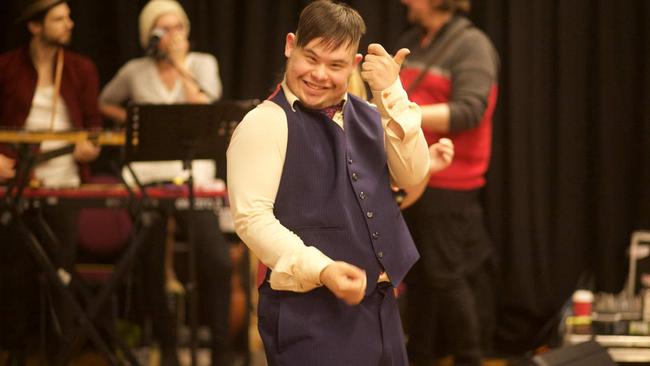
It’s a far cry from the early years when Chance had to scour the ’burbs for unused community halls or churches after she was asked to move on from the historic surrounds of Carclew.
But for Chance, the gratification of sharing in the dancers’ journeys and the joy she saw on the faces of their families and friends made all the hard work worthwhile.
Parents would pass on tales of their loved one boasting a new spring in their step, a new structure to their week and a new community of people to call their own.
“(It gave them) things to contribute to, something to be involved with and a sense of belonging,” she says. “And it was a sense of belonging by means of a non-verbal activity that allowed them to have a voice, as it were.
“Confidence was building, life was improving and fitness was developing all through this offer of a cultural activity to take part in.”
“One company member started talking about her culture. She was a young woman with Down syndrome. And she said ‘I have a culture, it’s Down syndrome’.
“And the idea that this was a culture with a language, with a very beautiful look, with practices and ideas and a style was really, really helpful.”
The early days of Restless in the 1990s coincided with like-minded organisations such as Arts Access SA and No Strings Attached promoting the idea of cultural awareness among people with a disability.
“All of these people were exploring the idea that rather than having a deficit, or having a lack, or having something that needed therapy, or needed to be cured or sorted out – it was the exact opposite,” Chance says.
“It was a way of being. A way of being in the world. A way of seeing the world. A way of describing the world. And it was incredibly exciting. It was the idea that, in fact, people without disability were the ones doing the integrating and the learning and gaining new perspectives on the world. It wasn’t about establishing a thing that the people with disability worked out how to enter. It was the other way around.
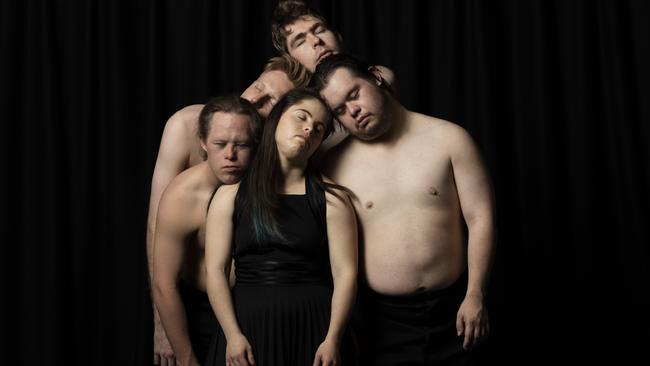
“I suppose it’s the opposite of segregation, isn’t it? It’s the idea that whoever we are we’ve got a cultural life and Restless contributes, among many other companies, to that diversity, and the idea that diversity is a social strength. It makes our society more tolerant, more enabling, more interesting and more diverse.”
In Chance’s eyes, the contribution the company made to the South Australian and Australian cultural landscape was just as significant as the benefit the dancers and their families received from their participation.
And thus it has remained for 30 years, six artistic directors and about 150 company dancers participating in countless rehearsals for more than 40 major productions. They’ve performed in major venues and festivals across Australia, including the arts and culture program of the 2018 Gold Coast Commonwealth Games. They took their award-winning Intimate Space show to South Korea for the Seoul Street Art Festival in 2019, and performed another show, Rewards for the Tribe, in the UK in the same year.
Company dancers are paid award rates when rehearsing and performing and have become regulars on the Adelaide festival scene. The company also has a rich history in the creation of dance films and its members were part of a film clip created by Adelaide band The Audreys for the song Are You There.
Restless’s list of awards is long and decorated. It has won several Ruby Awards, which honour the best of South Australian artistic endeavours, including one for sustained contribution and another for the aforementioned Intimate Space – an experimental collection of solo and duets. Intimate Space was performed to acclaim in the Hilton Hotel in the 2017 Adelaide Festival and also received back-to-back nominations in the national Helpmann Awards in 2017-18.
Restless is now under the stewardship of former professional dancer Michelle Ryan, a Townsville girl who moved to Adelaide to be part of Meryl Tankard’s renowned Australian Dance Theatre in the 1990s.
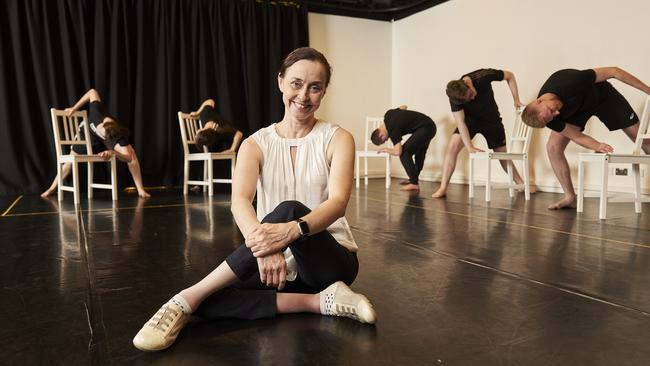
She became a dancer of global acclaim who was living her dream and travelling the world with Tankard and her award-winning company. And then, aged 30, she noticed she could no longer feel her calf muscles touching when she was in ballet’s first position. And then she noticed her fingers tingling when she lowered her head. Her life as a dancer disappeared in the blink of an eye when neurologists diagnosed her as having multiple sclerosis – a condition of the central nervous system which interferes with nerve impulses within the brain, spinal cord, optic nerves and causes scars to develop within the central nervous system. There is no known cure.
Ryan thought her career in dance was over. She returned to Australia and started working in the disability sphere. But then she was challenged to return to the stage with her walking stick and perform an arm dance. She accepted the challenge and that moment changed her mindset. She realised it wasn’t necessary for every dancer to have a perfectly functioning body or mind.
“For 10 years when I hadn’t danced, I always thought of myself as lesser, because I had acquired this disability,” Ryan says as she whizzes around her office in her wheelchair.
“And it was that moment when I went ‘actually … I don’t want any other artists to feel the way I did for 10 years’. I realised at that point that actually showing a vulnerable side of yourself in dance is actually really powerful.”
So when the job as artistic director at Restless came up in 2013, it was the perfect coalescence of her two passions and, even now, more than eight years later, she smiles every day when she comes to work. “I love the interaction with the dancers, because they think quite differently,” she says. “That’s actually an asset – to have that different, creative mind.”
Under her tenure, Restless has focused on challenging common misconceptions about people with disabilities and taking their performances to as wide an audience as possible. Thanks to Covid, the company has been unable to tour during the past 18 months so has turned to video and Zoom to keep spreading the word.
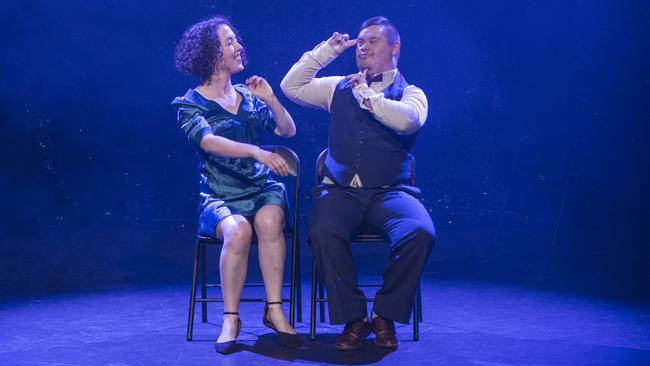
As we watch Michael Hodyl and hiscompany colleagues go through their paces in the Restless studio, their dedication, grace and natural talent is obvious even to the untrained eye.
Ryan’s eye is anything but, and she needs little prompting when asked to describe what she loves about Hodyl’s dancing. “He always has such flair, especially when he’s channelling (his idol) Ricky Martin,” she says with a smile.
“He has the most fluid and soft movement, and he’s got really good, stable legs and base. As a dancer, it’s really important that you can move your upper body and he’s got this beautiful high release. Beautiful fluidity. Which is something that comes naturally, it’s not something you can teach.”
Hodyl’s father Roman has watched his son’s gradual transformation and maturation accelerate over the past decade as he started spending more and more time at Restless.
Michael Hodyl, who has even taken to vacuuming the family house after learning cleaning skills at Restless, still loves performing just as much as ever.
“He dances all the time,” Roman Hodyl chuckles. “In the end, it can actually start to annoy me because I could be sitting down watching the news or something, and then an advertisement will come on, and as soon as there is music in the advertisement, he will just start dancing. He dances to anything.
“When he was younger, the concern was about what he was going to do when he got older. Well, that’s fixed itself up. He’s a dancer. We’re very proud of him.” ■



